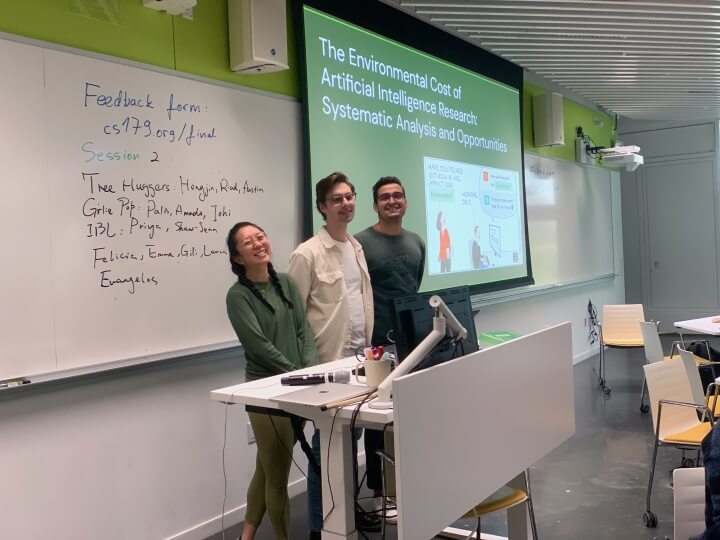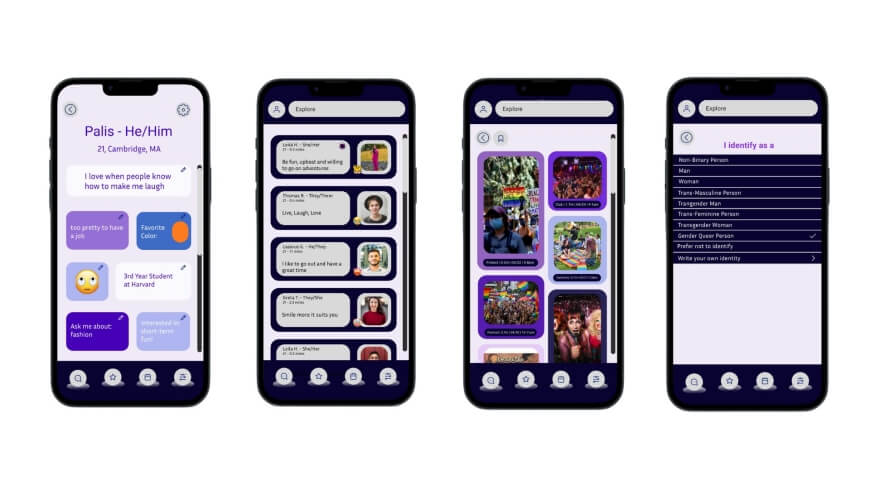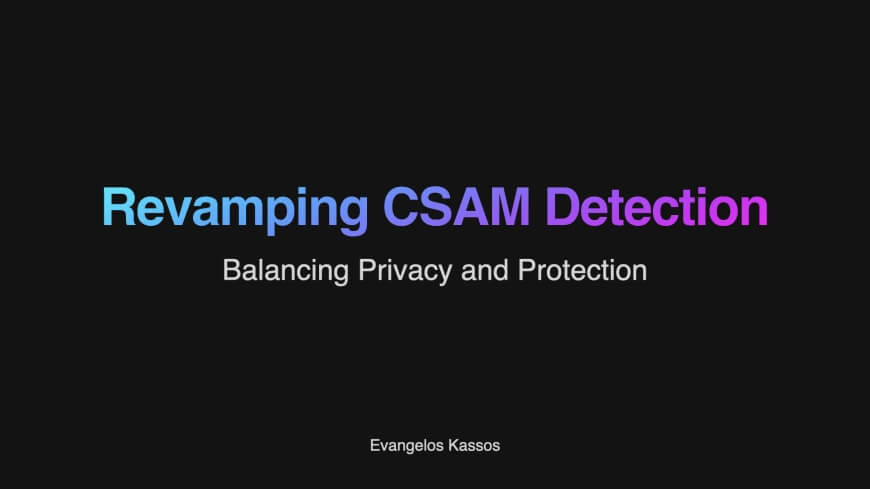News
Hongjin Lin, Austin Ledzian and Riad El Soufi present their final project for CS276. (Matt Goisman/SEAS)
A new class offered by the Harvard John A. Paulson School of Engineering and Applied Sciences (SEAS) challenges students not just to design technology, but to do so with thought and consideration for who will or won’t benefit from it. “CS276: Design, Technology, and Social Impact,” spent the Spring 2023 semester exploring technology’s place in society from a wide range of perspectives, from computer science and sociology to psychology and feminist theory.
The goal: create computer scientists who understand and accept the responsibility of designing in a world where products and technology can rapidly go from idea to commercial availability.
“When I was young, a computer scientist made an impact by going to Microsoft, working on a tiny feature, and 10 years later, after many eyeballs viewed it, it would become a reality,” said course instructor Krzysztof Gajos, Gordon McKay Professor of Computer Science at SEAS. “Now, the ideas that we come up with make it into the real world within months without anybody else being engaged, which can potentially have dramatic consequences. If we want to have the freedom to tinker with the world without adult supervision, we should have access to an intellectual toolkit for thinking about how technology impacts society.”
Gajos designed CS276 as a graduate-level course after successfully running a complimentary undergraduate-level course, “CS179: Design of Useful and Usable Interactive Systems.” The syllabus for CS276 focuses on topics such as the lack of consideration for marginalized groups when new technology or data science is implemented, successful and unsuccessful interactions between technology and education, and how a technology as simple as a water pump can greatly alter a community.
"Quonnect," a final project for CS276 designed by Palis Pisuttisarun, Jothi Ramaswamy and Love Candelario.
“One thing that was really interesting was thinking about all the frameworks of the class,” said Jothi Ramaswamy, a third-year computer science concentrator. “It teaches you to be more inclusive, to analyze computer science and technology from a more inclusive lens of different communities. It also made me better at recognizing internal biases and looking at unintended consequences and addressing them in my project.”
With such a wide range of topics in the syllabus, Gajos drew interest from students all over campus. Ph.D. candidates in computer science were joined by others from Harvard Medical School, Harvard Graduate School of Education, and Harvard Graduate School of Design (GSD). Undergraduates, master’s and Ph.D. candidates all came together to share different perspectives and contexts for technological design and implementation.
“What was really cool was that each one of these students brought a different set of superpowers, different experiences and projects that they’d worked on, and things that really bothered them,” Gajos said. “Having students from all these different disciplines sitting at the same table and discussing a topic, it was so wonderful to be a fly on the wall and listen to their conversations.”
For final projects, students were challenged to consider both technical and organizational, social, and community factors when analyzing a potential problem area and designing an intervention. A broad challenge resulted in a similarly broad range of projects, including: ways to optimize solar power development in Massachusetts; an app that allows LGBTQ+ people to connect using a range of identity and attraction markers more reflective of their community; using artificial intelligence to convert data from wearable devices into reports to reduce emergency department visits; a way to quickly find open beds in community homeless shelters; and an algorithm for companies to detect and halt the spread of online child sexual abuse material (CSAM) while still maintaining user privacy.
For a CS276 final project, Evangelos Kassos built an algorithm for companies to detect and halt the spread of online child sexual abuse material CSAM while still maintaining user privacy.
“Most methods right now have a process where you have to visually check the pictures to see if they match a known CSAM database,” said Evangelos Kassos, a senior studying computer science and molecular and cellular biology. “Because you need that visual identification, the biggest concern is that you also need to have access to every picture of every user. There’s a lot of privacy concerns there, so I’ve been trying to figure out a way to take away that need but still do actual detection.”
Lance Ying, a first-year Ph.D. candidate in computer science, collaborated on the project to create AI-generated reports based on wearable device data. He worked with Felicia Lang, who’s in her second year in the Master of Design Engineering program offered by SEAS and GSD, and computer science Ph.D. candidates Gili Rusak and Emma Chen.
Ying and Liang have taken very different academic journeys at Harvard, but CS276 made it possible to combine and feed off each other’s perspectives.
“I came here with a few years of professional product design experience in corporate consulting, start-ups and big tech, and the design frameworks that they used were all similar,” Liang said. “This class created a very safe space for people from all backgrounds to share their experiences and push the boundaries in terms of what we know about the traditional design process. This was one of the best classes I’ve taken throughout all my entire academic years.”
Topics: Academics, Computer Science, Ethics
Cutting-edge science delivered direct to your inbox.
Join the Harvard SEAS mailing list.
Scientist Profiles
Krzysztof Z Gajos
Yahn W. Bernier and N. Elizabeth McCaw Professor of Computer Science
Press Contact
Matt Goisman | mgoisman@g.harvard.edu





